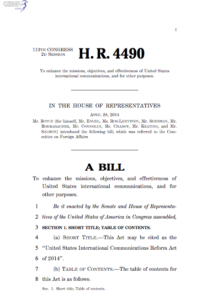
International Broadcasting Bureau – Information War Lost: Götterdämmerung – Issues Of Reform, Rehabilitation, Rebirth
By The Federalist
On Wednesday, April 30, 2014 the House Foreign Affairs Committee reported out a bill, H.R. 4490, the “United States International Communications Reform Act of 2014.”
The bill addresses what is commonly known and accepted to be the dysfunctional and defunct state of US Government international broadcasting. It represents a substantial body of work by the committee members and their staffs to capture the full extent of the agency’s problems. It doesn’t leave any stones unturned.
The bill was reported out of committee by unanimous vote in a demonstration of bipartisanship – an indication of common agreement without regard to political party affiliation on the seriousness of the problem.
We support the conclusions reached in the bill and its intended outcomes. It is in the national and public interest that it be signed into law.
The findings and declarations of the bill read like a major indictment of the agency’s failed “strategic plan,” its horrid reputation for being one of the worst agencies in the Federal Government, enormous abuse of contracting out procedures and other examples of what has become a rogue agency in the hands of individuals who, to all appearances, seemingly put their personal quests for power above and beyond the law, without concern for the consequences to the national and public interests of the United States.
A detailed examination of the bill can be found on the BBG Watch website or that of the US House of Representatives.
LINK TO: HR 4490, The United States International Communications Reform Act
We turn our attention to another event later in the day on April 30 – that being one of the absurd “staff meetings” held in the Cohen Building auditorium presided over by the agency’s “interim management team” which only partially replaced the management team responsible for nearly all of the agency’s disasters. We describe these meetings as such because they are a waste of time and accomplish nothing constructive. This meeting was no different.
What sets this particular exercise apart from others was the reaction by certain employees of the Voice of America (VOA) Central Newsroom to H.R. 4490. Clearly, these employees have a negative view of the scope and direction of the bill.
The Sky Is Falling – NOT!
We have established a well-known public record of support for the VOA Central Newsroom. On numerous occasions, we have stated clearly that the success or failure of the agency’s mission begins and ends in the VOA Newsroom. We have been supportive of individual staffers, including the recently retired Newsroom veterans Gary Thomas and VOA’s senior White House correspondent Dan Robinson.
As much as we are supportive of the staff, it has exhibited some characteristics that we find wanting. Too often the staff complains about the people in charge, expects someone else to solve their (the Newsroom’s) problems for them and then complain about the people and/or the intended solutions providing necessary remedial action (in this case, Members of Congress, their staffs and congressional legislation)!
There is a great deal of irony here, in the forum staff members chose to be pedantic, forgetting that at the levels previously above the “interim management team,” IBB officials, many of whom are still around, have attempted to disassemble the Newsroom in its entirety.
In essence, Newsroom staffers are fearful that the bill turns the agency into a propaganda machine. We find this odd, since the bill re-affirms provisions of the VOA Charter and recapitulates the agency’s mission. The Charter has been around since 1976.
There is nothing new here.
The staffers also seem to be in an uproar over the tie-in with the State Department and public diplomacy. Is there something substantively new here?
No.
These links had been much stronger under the former United States Information Agency (USIA) than the current bill calls for and VOA managed then, particularly in later years, to preserve its editorial independence thanks to the VOA Charter. The Secretary of State – most often through the Undersecretary of State for Public Diplomacy and Public Affairs – already has a seat on the BBG board. Nothing really new here, or in the agency’s relationship with the State Department. Pictures of BBG members and the Secretary of State have been prominently displayed in the hallway leading to the senior agency executive offices in the 3300 corridor of the Cohen Building.
Complaining to the “interim management team” about the provisions of H.R. 4490 is, in effect, a vote for the status quo and that is dead wrong. Remember what the status quo is: dysfunctional and defunct. This is beyond bizarre: senior IBB officials, replaced by the interim management team, are the ones who have put the agency in its failed status. Do some of VOA Newsroom staffers want them back?
These employees also seem to have lost sight of the fact that from time to time, senior officials have declared the agency to be an integral part of the government’s national security apparatus. Somehow, they missed hearing that justification for the agency’s management paradigm.
So, What’s New?
What is new is a much higher degree of accountability and reporting on the progress of rehabilitating the agency, including a thorough examination of the bureaucratic bloat throughout the agency.
Add to that, the Broadcasting Board of Governors (BBG) is removed from managing the agency to an advisory role. And perhaps even more importantly, the International Broadcasting Bureau (IBB) bureaucracy is diminished.
Talk Around Town
The BBG is not the only corner of the Washington establishment looking for closer ties to the government’s national security apparatus. A recent panel discussion at the Heritage Foundation on April 21 included the topic of a much more formal, integrated role for the agency within the Federal Government’s national security apparatus.
Our friends in the Newsroom may have forgotten that decisions over language service broadcasts do not come just from the Congress. They also emanate from the National Security Council (NSC).
With “Friends” Like These
Here’s another thing:
What is in the proposed budget for FY2015? Answer: more cuts to the Newsroom and the agency’s language services.
How is it that Newsroom staffers could even remotely arrive at the conclusion that senior management officials, who had proposed these cuts, were sympathetic to their concerns?
While we hope it isn’t an intended outcome, the Newsroom staffers railing against H.R. 4490 are doing a masterful job of advocating for the return of the old IBB management team for perpetuating their management paradigm. Some of those officials are still around.
We have to tell you: it isn’t going to happen.
It is not in the national and public interest to make permanently institutionalized a construct of a Federal agency that is dysfunctional and defunct.
We are aware that there is a sentiment among some staffers that the VOA should lord over all US Government international broadcasting. We don’t know why that sentiment is out there. The federally funded US Government grantee/surrogate entities have been part of the US Government international broadcasting landscape almost as long as VOA.
The Newsroom staffers should be happy that the bill creates a demarcation between VOA and the US Government grantee/surrogate broadcasters, each with separate chief executive officers (CEOs). Keep in mind that under the former senior agency management world view, the intent was to co-mingle reports from the grantees and VOA, along with a heavy presence of third party news service content. These same staffers most certainly do not like the co-mingling idea any more than the “43 newsrooms” concept advanced by David Ensor (the VOA director) and Steve Redisch (the VOA executive editor).
In the face of all that has taken place, the arguments offered by Newsroom staffers in the agency staff meeting make them look incredibly gullible, naïve and in some serious form of blind denial none of which serve both their short and long-term interests. The only interests being served are those of the IBB’s discredited executives: to spread disinformation and misinformation intended to regain or preserve their positions in the hope of defeating pending legislation.
At the end of the day, H.R. 4490 makes the right call: the IBB has to go and there must be more stringent accountability for this agency. The IBB has no one to blame for this other than themselves. They created the problem. They are the problem: dysfunctional and defunct.
For failing to come to grips with the problem, the board takes a hit as well, ultimately being relegated to an advisory role.
In the question-and-answer session following the main presentation at the Heritage Foundation, former BBG member Blanquita Cullum remarked of the IBB, “They should be exiled to bureaucratic Siberia.”
Perhaps even that is too charitable for the damage they have done.
The Federalist
May 2014

